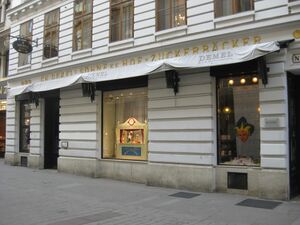Club 45
(Deep state faction) | |
|---|---|
 The club had its locale over the famous Demel pastry shop in Vienna | |
| Formation | 1973 |
| Founder | • Leopold Gratz • • Fritz Marsch |
| Extinction | 1992 |
| Headquarters | |
| Interests | Social Democratic Party of Austria |
| Membership | • • Fred Sinowatz • • Helmut Zilk • Karl Sekanina • Günther Haiden • Herbert Salcher • Franz Kreuzer • • Gerhard Weissenberg • Karl Lausecker • Ernst-Eugen Veselsky • • • Walter Flöttl • Karl Vak • Heinz Kien • Theodor Mellich • Otto Binder • Erich Göttlicher • Walter Fremuth • Kurt Meszaros • • Johann Buchner • Friedrich Dragon • Teddy Podgorski • Karl Reidinger • Karl Blecha |
| Austrian gentlemen's club based around the Social Democratic Party. Place for patronage,corruption and deep politics. | |
The Club 45 was an Austrian club founded in 1973 by leading members of the Social Democratic Party[1][2] after inspiration from Henry Kissinger. There are numerous theories that Club 45 was a "secret club" in the style of the Italian secret lodge Propaganda Due. For a long time rumors circulated that all sorts of goings-on from the influential were recorded with hidden cameras.
Founding
In 1969, Chancellor Bruno Kreisky sent his protégé Hannes Androsch (later member of the Bilderberg steering committee) to Harvard University for a year. There he attended Henry Kissinger's seminars. Androsch was particularly excited by Kissinger's lectures on "the organization and exercise of power".[3]
The politicians Leopold Gratz, Hannes Androsch and Fritz Marsch turned to a mutual friend, Fritz Eder, with the request to find a locale for a club. He brought in his friend Udo Proksch, who had just bought the Demel pastry shop on Vienna's Kohlmarkt for 18 million schillings (around 5,200,000 euros based on today's purchasing power) hoping that a suitable place could be found there. Proksch agreed, and in 1973 the club was formed.
The name Club 45 came from a group of friends from the Socialist Student Union who all started their careers in 1945. They vowed lifelong friendship and mutual unconditional support for their personal careers.
Gentlemen's club
The club was a kind of social democratic gentlemen's club to which the heads of Austrian politics (SPÖ) and economy of the 1970s belonged. At its peak, at the time of the absolute majority of the SPÖ, the club saw itself as a meeting point for Austria's political and economic elite.
In the bestseller The Lucona Affair by Hans Pretterebner the club is also described as mafia instrument of power of the Social Democrats, which by a system of corruption, handing out of positions and nepotism quite successfully took possession of the country.
At its peak, 200 members came to the club meetings. Club president was Leopold Gratz, later Karl Heinz Demel. The monthly membership fee was 300 schillings (around 86 euros based on today's purchasing power).
The Lucona affair
The Lucona affair put an end to Club 45. The Lucona was a bulk carrier that was sunk in an explosion in the Indian Ocean on January 23, 1977 in the course of attempted insurance fraud, whereby six of the twelve crew members died. In the course of the subsequent investigation, the incident expanded into modern Austria's biggest political scandal, in which several top politicians were entangled and which rocketed the country from 1977 to 1992.
In 1992 the club was finally dissolved.
There are numerous theories that Club 45 was a "secret club" in the style of the Italian secret lodge Propaganda Due. For a long time rumors circulated that Proksch had recorded all sorts of goings-on from the influential with hidden cameras. He is said to have blackmailed them and thus prevented or delayed an investigation into the Lucona case.
Members
Among the prominent socialists who came into government between 1974 and 1989 through their membership in "the Red Lodge", the following can be mentioned: Franz Vranitzky (Chancellor), Fred Sinowatz (Chancellor), Hannes Androsch (Vice- Chancellor), Leopold Gratz, Heinz Fischer, Helmut Zilk, Karl Sekanina, Günther Haiden, Herbert Salcher, Franz Kreuzer, Willibald Pahr, Gerhard Weissenberg, Karl Lausecker, Ernst-Eugen Veselsky, Karl Lütgendorf and Erwin Lanc.[3]
The most powerful people in Austria's financial circles were of course also members of the Masonic Cafe: Walter Flöttl (BAWAG), Karl Vak (Central Savings Bank of the Municipality of Vienna), Hannes Androsch (Creditanstalt), Heinz Kien (National Bank), Theodor Mellich (Girozentrale), Otto Binder and Erich Göttlicher (Wiener Städtische Versicherung); Executives from the nationalized companies such as Walter Fremuth (Verbundgesellschaft), Kurt Meszaros (OMV), Heribert Apfalter (VOEST) and Johann Buchner (Chemie Linz).[3]
There were also executives of the media such as the Kronen newspaper editor Friedrich Dragon and the ORF chairman Teddy Podgorski, as well as the head of the Vienna police, Karl Reidinger.[3]
Known members
6 of the 28 of the members already have pages here:
| Member | Description |
|---|---|
| Heribert Apfalter | Austrian businessman who attended the 1979 Bilderberg. Sold weapons to Iran and Iraq. His sudden death in 1987 was surrounded by rumors of foul play. |
| Heinz Fischer | President of Austria for 12 years. 3 Bilderberg |
| Erwin Lanc | Attended the 1979 Bilderberg as Austria/Minister of Interior. Club 45. Lucona Affair. Gave passport to Jeffrey Epstein. |
| Karl Lütgendorf | |
| Willibald Pahr | Single Bilderberg Austrian Club 45 politician who attended the 1979 Bilderberg conference as Foreign Minister. President of the European Movement of Austria and Vice-President of the European Federalist Movement of Austria. |
| Franz Vranitzky | Chancellor of Austria, central banker, Bilderberg Steering committee |